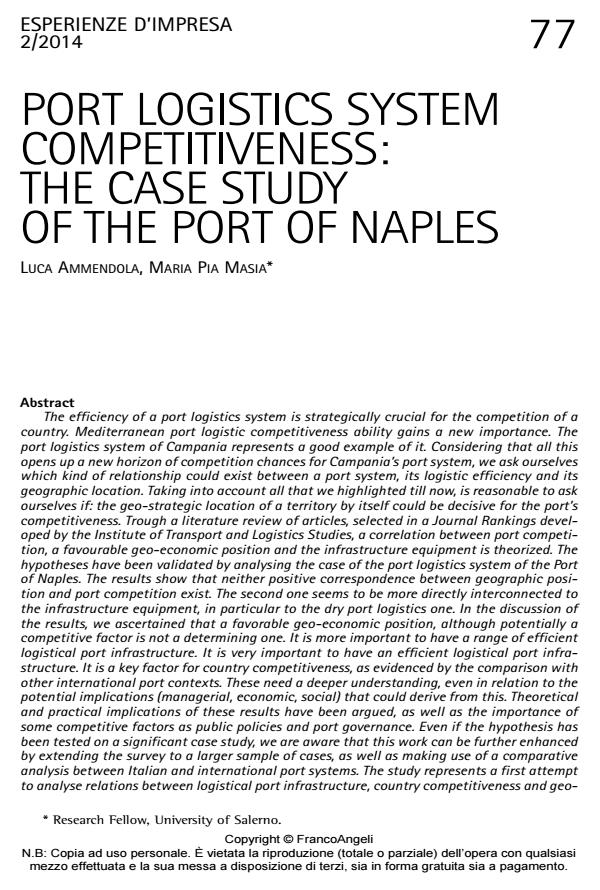Port logistics system competitiveness: the case study of the port of naples
Titolo Rivista ESPERIENZE D'IMPRESA
Autori/Curatori Luca Ammendola, Maria Pia Masia
Anno di pubblicazione 2015 Fascicolo 2014/2
Lingua Italiano Numero pagine 19 P. 77-95 Dimensione file 191 KB
DOI 10.3280/EI2014-002005
Il DOI è il codice a barre della proprietà intellettuale: per saperne di più
clicca qui
Qui sotto puoi vedere in anteprima la prima pagina di questo articolo.
Se questo articolo ti interessa, lo puoi acquistare (e scaricare in formato pdf) seguendo le facili indicazioni per acquistare il download credit. Acquista Download Credits per scaricare questo Articolo in formato PDF

FrancoAngeli è membro della Publishers International Linking Association, Inc (PILA), associazione indipendente e non profit per facilitare (attraverso i servizi tecnologici implementati da CrossRef.org) l’accesso degli studiosi ai contenuti digitali nelle pubblicazioni professionali e scientifiche.
The efficiency of a port logistics system is strategically crucial for the competition of a country. Mediterranean port logistic competitiveness ability gains a new importance. The port logistics system of Campania represents a good example of it. Considering that all this opens up a new horizon of competition chances for Campania’s port system, we ask ourselves which kind of relationship could exist between a port system, its logistic efficiency and its geographic location. Taking into account all that we highlighted till now, is reasonable to ask ourselves if: the geo-strategic location of a territory by itself could be decisive for the port’s competitiveness. Trough a literature review of articles, selected in a Journal Rankings developed by the Institute of Transport and Logistics Studies, a correlation between port competition, a favourable geo-economic position and the infrastructure equipment is theorized. The hypotheses have been validated by analysing the case of the port logistics system of the Port of Naples. The results show that neither positive correspondence between geographic position and port competition exist. The second one seems to be more directly interconnected to the infrastructure equipment, in particular to the dry port logistics one. In the discussion of the results, we ascertained that a favorable geo-economic position, although potentially a competitive factor is not a determining one. It is more important to have a range of efficient logistical port infrastructure. It is very important to have an efficient logistical port infrastructure. It is a key factor for country competitiveness, as evidenced by the comparison with other international port contexts. These need a deeper understanding, even in relation to the potential implications (managerial, economic, social) that could derive from this. Theoretical and practical implications of these results have been argued, as well as the importance of some competitive factors as public policies and port governance. Even if the hypothesis has been tested on a significant case study, we are aware that this work can be further enhanced by extending the survey to a larger sample of cases, as well as making use of a comparative analysis between Italian and international port systems. The study represents a first attempt to analyse relations between logistical port infrastructure, country competitiveness and geographic position. In conclusion, it would be interesting to consider even port governance among the competitive factors, as it uses public and private financial resources and often decides on their final use.
Parole chiave:Port logistics, Intermodal logistics and integrated logistics, Dry port system.
Luca Ammendola, Maria Pia Masia, Port logistics system competitiveness: the case study of the port of naples in "ESPERIENZE D'IMPRESA" 2/2014, pp 77-95, DOI: 10.3280/EI2014-002005